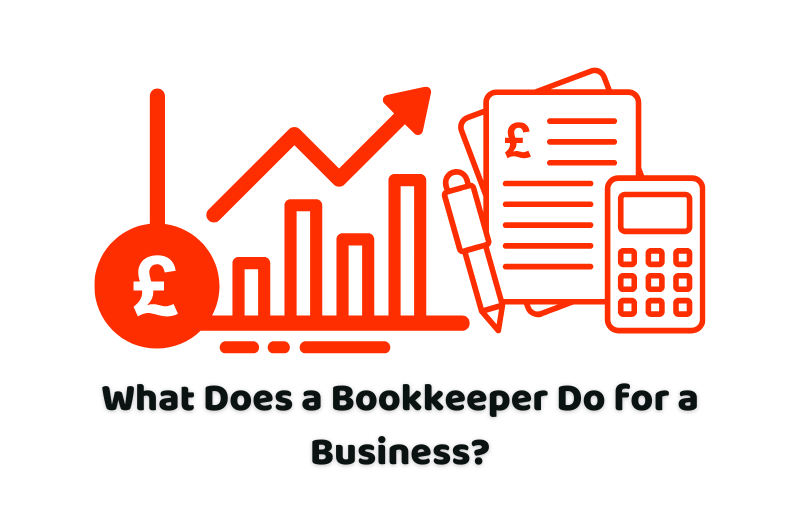What Does a Bookkeeper Do for a Business?
Financial management is important for any business, especially when it comes to operating business activities in the UK. This is where bookkeepers come in to play their crucial role, making the whole process a lot simpler. What a bookkeeper does for a business is a common question among beginners. This concerns the accurate, precise, and updated records pertinent to the organisation’s business transactions. Well, running the business with great focus asks for the time, and if you have a good bookkeeper, you will be able to free up your time for that. Today’s blog is based on what a bookkeeper does for businesses in the UK. To learn more about what a bookkeeper in the UK does for a company, let us keep reading.
Talk to one of our intelligent and clever professional bookkeepers to get your further queries about bookkeeping services in London. We will ensure to come up with the best possible solution for you.
What Does a Bookkeeper Do for a Business?
What does a bookkeeper do for a business? The main role is to order and oversee the organisation’s day-to-day finances. Their professionalism guarantees that all the monetary operations reflect the actual picture that is necessary for taxation and forecasting. Here are some practical examples of what does a bookkeeper do for a business in the UK.
1. Accurate Financial Records: All records are kept in order in a manner that minimises mistakes and other impreciseness of the income and expenditure accounts.
2. Compliance with UK Regulations: It is quite challenging to curb the tax laws and financial regulations that prevail in the UK. Bookkeepers help businesses in this regard.
3. Time-saving: They also release a lot of time for business owners because bookkeepers deal with all the financial chores.
What are the Core Duties of Accounting for a Bookkeeper in the UK?
Moreover, the job description of a bookkeeper in firms operating in the United Kingdom is more than just entering transactions. Some core responsibilities of bookkeepers include reading the hypothesis, such as identifying the components of business success and focusing on financial transactions Recording Financial Transactions.
A bookkeeper documents all payments made or received in a company. These include sales, purchases, employees’ wages, and sundry costs. They also keep web resources that are useful for keeping track of the financial performance of companies since records have to be accurate. Moreover, handling invoices and payments is also one of the primary roles of the bookkeepers in the UK. This makes sure that bills are raised and that they are also paid on time.
They also prepare important figures in the company, such as the profit and loss statement as well as a balance sheet. The UK has strict rules about taxation that any business within the country has to follow. Bookkeepers assist by sorting out papers, completing form VAT, and providing ordinary documentation necessary for compliance with HMRC.
If you want to know more about what is bookkeeping in detail, visit our articles we have discuss all the information required on that specific topic.
Why is a Bookkeeper a Reliable Financial Resource for Businesses?
Businesses, especially in the UK, are very focused financially and required to keep their records maintained all the time. Here’s an explanation of how bookkeepers have become a reliable financial resource for businesses in the UK.
- Cost-Effective Financial Management: It is more cost-effective than hiring a full-time accountant, something small businesses can consider doing to hire a bookkeeper.
- Preventing Cash Flow Issues: Through recording income and expenses, which are usually different or inconsistent at times, bookkeepers assist organisations in avoiding an unfavourable cash flow position. If not handled well, this may disrupt operations in an organisation.
- Providing Financial Clarity: Accountants disintegrate complicated financial data so that owners or managers of firms can know the state of their financial position.
What Makes a Bookkeeper Different from an Accountant?
Bookkeepers are more specialised in recording and sorting financial information to fulfil the need to prepare financial reports. However, accountants interpret those financial data to offer practical suggestions. Of course, each business needs the help of a bookkeeper to maintain precise records that are appropriate for use and help the companies in their adherence to the laws of the UK.
When it comes to the regard of fees, it differ in the experience and the scale of the job being done regardless of whether you hiring an accountant or a bookkeeper. Furthermore, opinions vary when it comes to the price of their service; you will come across many bookkeepers who will be willing to work with you regardless of the size of your business. While there are accountants with traditional solutions that can also assist. It still will not be the same as having a professional bookkeeper who will consult with and contribute valuable knowledge.
The Bottom Line
In conclusion, it is crucial to develop an understanding of what does a bookkeeper do for a business before making decisions. Their job might include keeping records ordered and by the laws. They are the ones who keep entering checks, invoices, and receipts into computers, as well as preparing accounts that are necessary to keep a business going. Regardless of whether you are the owner of a beginning-stage start-up or you own a blossoming company, a bookkeeper can be of great help, as he will relieve you of some of the everyday duties while helping your business to grow. To learn more on this, you can also get in touch with one of our accounting experts.
Disclaimer: All the information provided in this article on what a bookkeeper does for a business, including all the texts and graphics, is general in nature. It does not intend to disregard any of the professional advice.

